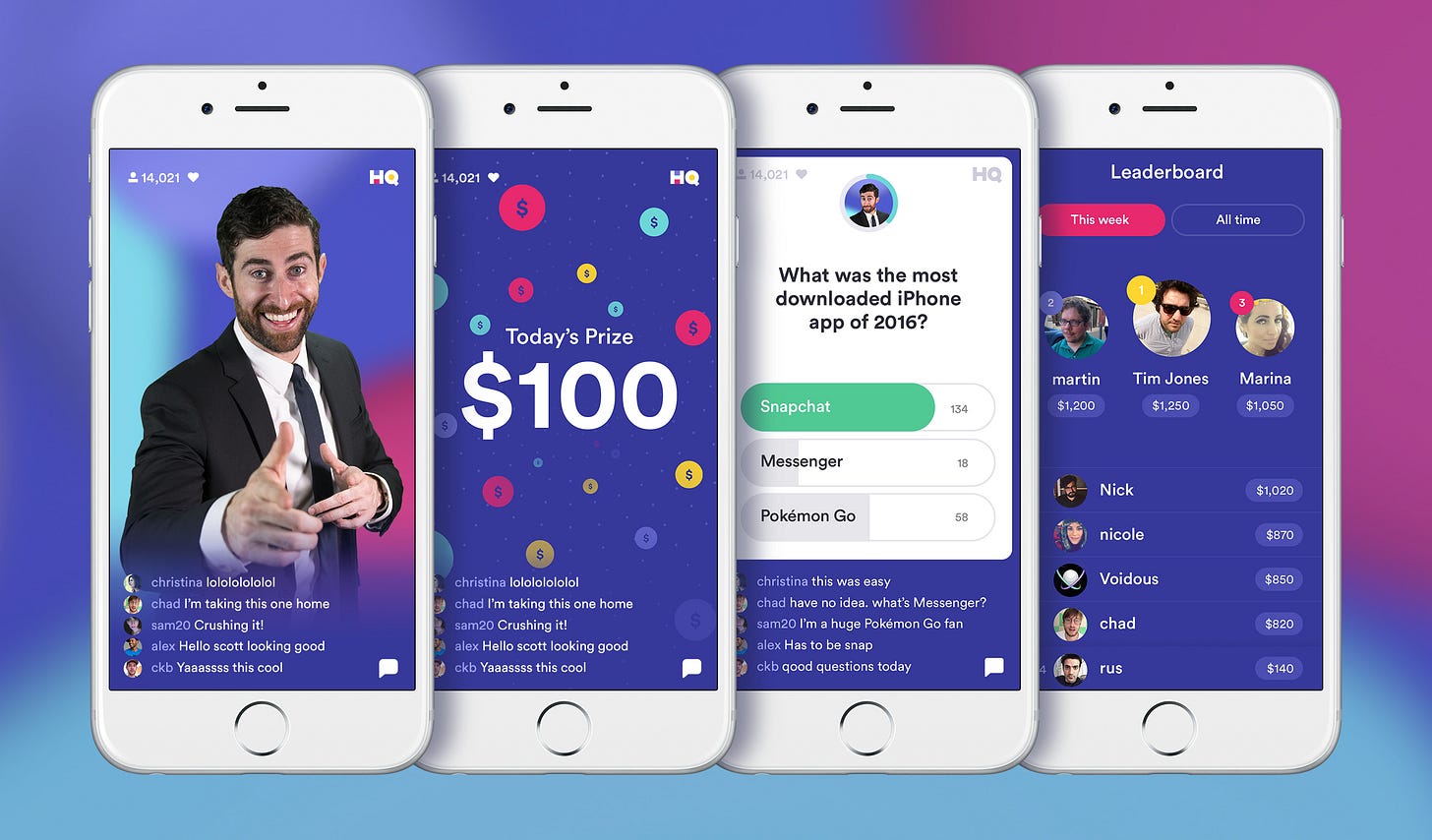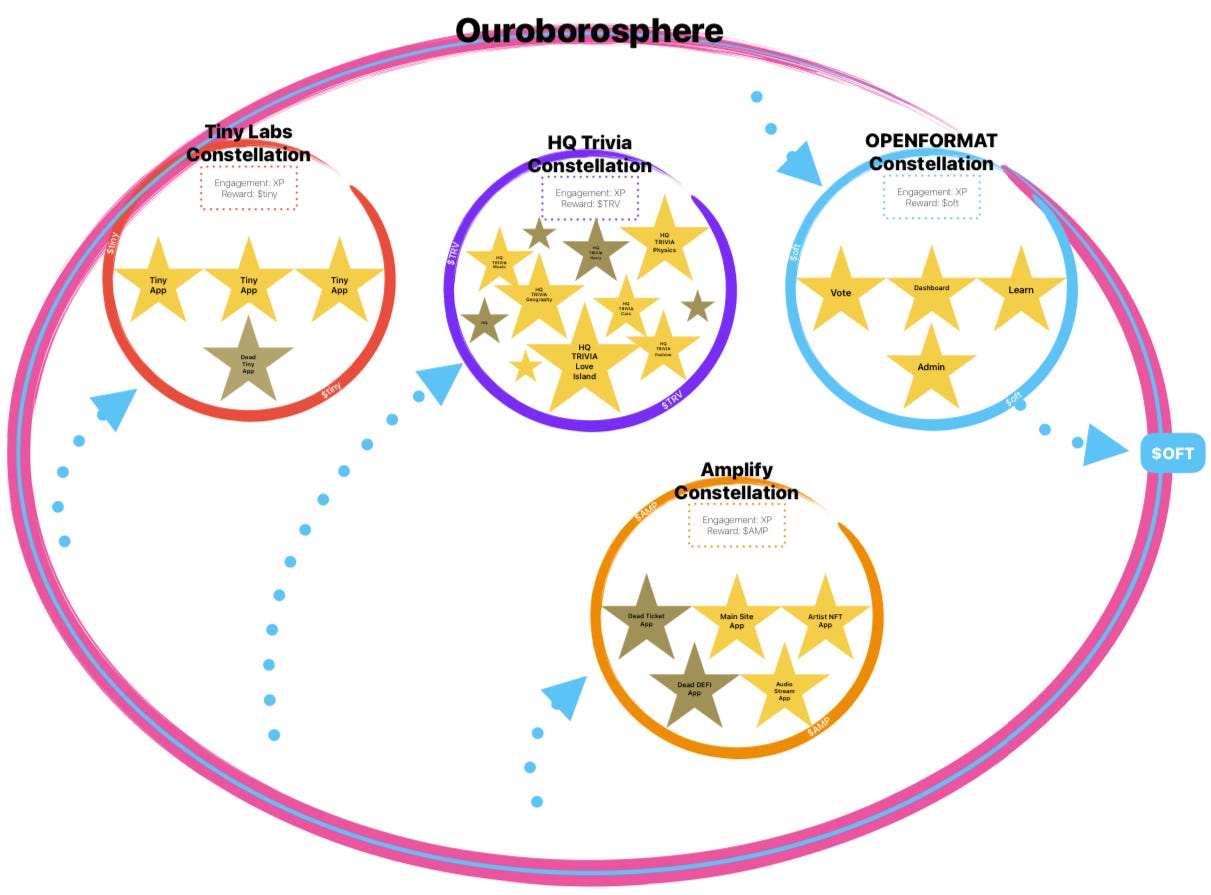Tiny Apps & Open Code - Small is Beautiful
A short essay exploring small disposable apps using HQ Trivia as an example.
Small is beautiful. It’s not a new concept. EF Schumacher 50 years ago devoted an entire book to the concept of capitalism based on making business smaller, decentralised, more human.
Here’s a quick summary of the book from Google’s Bard:
Economic growth and development should be based on human needs and values, rather than on the pursuit of profit and material possessions.
The current economic system is unsustainable and it is leading to environmental degradation, social inequality, and spiritual emptiness.
A new economic model is needed that is based on small-scale, decentralized production, appropriate technology, and a strong sense of community.
These concepts seem more appropriate now than at any time since they were written. In a very short space of time we’ve been through the many ages of the Web, with the “cloud age” or Web2 as the Labelists call it, currently peaking economically, politically and socially. People are wising up to the relentless data breaches, fees out of their control, and huge profits that don’t directly help them.
"It strikes me as downright tragic that this decentralised wonder of the world is now largely operating on computers owned by a handful of mega corporations." - David Heinemeier Hansson
David Hanmeier Hanson, founder of Basecamp and Ruby on Rails is one of the many early adopters pointing out that the vast centralisation of data and services has perhaps been a misnomer, and while he doesn’t allude to a better way he does discuss how taking control and managing your own infrastructure is a cost effective and safer prospect in the coming years.
The Time of the Tiny App
So wait what… tiny apps are the answer? Well, in short yes. On many levels. And behind this Tiny App thinking are four key mind shifts:
Disposability - build apps assuming they won’t last
Interoperability - build apps that even if hosted disparately still work together
Simplicity - build apps that do one thing really well
Expandability - open the code base to others to build apps
To give you a simple (and currently topical thanks to CNNs documentary) example let’s explore HQ Trivia.
When HQ trivia popped into the AppStore about six years ago it was a small beautifully produced mobile app that at a set time each day ran a live quiz with a real host, fifteen questions and cash prizes. Anyone could take part and contestants were eliminated as they failed to answer questions correctly until there was none left or the prize had been reached. It was the Snapchat generations version of Who Wants to be a Millionaire. It did one thing really well.
It rocketed to success. Within months millions of players all tuning in on a regular basis via this new form of IRL interactive TV. It genuinely felt like the future of TV might have arrived… It hadn’t… It blew up and and blew itself out. Or as Packy from NotBoring would say it went supernovae after burning brightly for a short period like Yo, Clubhouse and the many other small apps that come along riding the current zeitgeist and then disappear.
What if HQ Trivia had created a few more apps? Instead of putting everything into building the one fat app to rule them all, what if they went sideways? A niche geography version, a quantum physics version, or a version totally scoped to a small town’s knowledge (which could be many multiple versions for all the towns), what if they open sourced the code base and let anybody build their own version? A whole ecosystem of HQ Trivia…
Sounds great if you don’t mind losing track of the IP, not having any obvious business model, lack of user portability between apps, no multi property metrics, etc, etc, etc… 🤷🏽♂️
This is the problem that we’ve been exploring with OPENFORMAT for the last 18 months, we think we’re onto something… The solution here is a tri-token system (that is a cinch to set up) which we can use to glue together this ecosystem into a sensible, useful and manageable constellation of small applications.
Each of these HQ Trivia apps could derive from the same basic code base, each with their own AI or human host, asking AI generated questions, based on the same format of 15 real-time questions. Each app culturally relevant to its intended audience. Each app is powered by the three tokens deployed at the constellation level with the notions of:
access via a Badge Token (an NFT)
an Action Token (XP) for metrics, leaderboards and progress
a Reward Token for prize redemption
Every HQ Trivia app emits and absorbs these tokens, joining the constellation together into a decentralised mass of individuality and coherence.
Every HQ Trivia app in the constellation can be born, burn as brightly as possible for a period, and then die out as naturally as the user cycle allows it - except now there’s pervasive users (and data) that can flit from one HQ Trivia app to another seamlessly, bringing their history, their winnings, their trophies to each new app that they try or that gets birthed.
This “dataverse” is always alive until the last app in the constellation dies, and even then the data is still available to be reignited at some point…
As a bonus; developers are incentivised by being rewarded for the success of their specific HQ Trivia app (i.e. every transaction their app produces they get a reward for) then the constellation becomes even more buoyant and the importance of app disposability increases as failing fast and iterating are the main drivers for each developer of an HQ Trivia app - which in theory also keeps the users of the constellation satiated - keeping the idea alive if even the execution/manifestation of the product changes.
On the one hand this is a big concept that feels fresh and exciting, on the other hand this is a simple old world view that technology has (finally) caught up with. The future of how humans interact with technology is only going to become more abstracted, with more apps being made by less (technically) skilled people thanks to advances in AI based no-code and the disposability of these apps is going to fill the App Store graveyards of tomorrow like never before.
Big creates fear, it hides truths; big smothers us in jargon and marketing, and big makes us lose hope. Small is beautiful.




